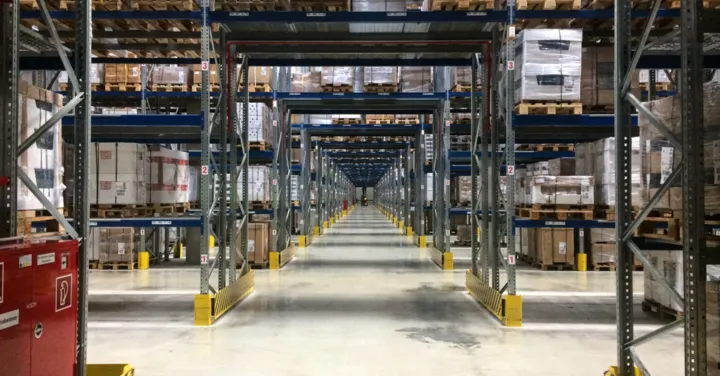The Need to Know: Five Trends to Watch in Peak Season 2023

Time waits for no one. While it’s easy to get distracted by the warm weather and summer BBQs, logistics never sleeps. Peak season 2023 is right around the corner, and the winds of change are gusting through with five key trends.
- An e-commerce sector that continues to grow.
- Continuous labor concerns.
- Chaos and complexities with carriers.
- A renewed focus on supply chain resilience.
- Sustainability and eco-friendly initiatives.
As strategic thinkers refine their focus and businesses stay vigilant, let’s peel back the layers of these trends. Step one, though, is to reflect on last year’s peak season, recap what happened, and apply valuable lessons learned.
Peak Season 2022: The Peak That Wasn’t
Reflecting on 2022's peak season unveils critical insights that should inform strategies for the uncertain 2023 season. Let's unpack a few of them based on data revealed in EasyPost’s report, “4 Lessons from the 2022 Peak Season.”
Same-Day Shipping Surges
In 2022's peak season, shoppers abandoned carts 56% of the time due to slow deliveries, while 79% demanded two-day free shipping. Moreover, 2022 witnessed a 25% year-over-year surge in same-day shipping requests. This trend could accelerate us towards a future where, by 2025, nearly all retailers - 99% - might offer same-day shipping.
The Plague of Package Theft
Unfortunately, with the rise in deliveries came an uptick in package theft, a 23% increase from 2021, amounting to nearly $20 billion worth of goods. Package theft now tops the list of American crime concerns heading into 2023.
Carrier Performances
In the 2022 peak season race, UPS delivered with 97.5% punctuality, followed by FedEx at 95.2% and USPS at 94.3%. However, parcel theft told a different tale. In 2022, a breakdown by carriers revealed that Amazon accounted for 54% of all thefts, followed by FedEx with 15.5%, UPS with 11%, and other carriers comprising the remaining 19% of package thefts. There’s a reason why package theft ranks as the top crime concern for Americans heading into 2023.
Tech-Forward Approach and Downtime
In 2022, downtime became an expensive misstep, with every minute costing companies an average of $5,600. There were instances where software platforms buckled under the pressure of peak season, reminding us of the urgent need for robust, reliable solutions.
Five Trends to Watch in Peak Season 2023
Now that we've recapped peak season 2022, let's turn our focus toward 2023. The lessons from 2022 are important but can only take us so far. So let's proactively explore five pivotal trends ready to shape the 2023 peak season narrative, ushering us into an era of innovative strategies.
E-Commerce Continues to Grow
2023 has witnessed an overall drop in package volumes, and the certainty of peak e-commerce volumes reaching previous heights this year is less assured. There is reason to believe that we may be looking at a softer peak this year.
Having said that, e-commerce’s strength endures and the data paints a vivid picture: the U.S. e-commerce market is on track to surpass $1.1 trillion in sales this year. Online shopping attracts 79% of consumers monthly, and online transactions account for over a fifth of all retail purchases.
Labor Availability
With the dawn of peak season 2023, potential labor shortages pose a significant threat to shippers. Shippers must closely monitor the shifts in this still-uncertain labor market, from warehouse operations to fulfillment centers to transport capacity. Otherwise, crippling disruptions will become a mere formality.
According to a survey from the 2023 ProMat conference, a majority of supply chain leaders highlighted recruitment and retention (57%) and talent shortage (56%) as significant hurdles. To combat these challenges, 74% plan to boost tech investments to foster high-productivity roles. Simultaneously, 41% of these leaders are proactively reskilling their workforce, paving the way for a tech-savvy environment to streamline processes and diminish repetitive tasks.
In the face of inconsistent volume surges, warehouse operators also feel the heat of labor market hurdles. Indeed, 73% struggle to attract employees. However, only 48% are considering flexible staffing models, with a mere 44% investing in this approach, despite 25% of U.S. workers immersed in the gig economy.
Carrier Chaos
Shippers gearing up for the 2023 peak season face a carrier landscape akin to navigating a storm. Escalating complexities and chaos, fueled by labor shortages and closures from shrinking volumes, take the challenge to unprecedented levels.
The initial optimism in the first quarter quickly turned into a freight recession, as reported by J.B. Hunt. Capacity outweighed demand, driving rates downward and triggering significant upheavals, including acquisitions and bankruptcies. The Freight Sentiment Indexes for Q2 further paint a challenging picture for carriers, brokers, and shippers, as full recovery remains distant, despite long-term optimism. The overall score turned negative for the first time since Q4 2022, with carriers' near-term profitability at a disheartening -11.22. The workforce sentiment also came in at a bleak -4.26, suggesting a reduced staff by quarter's end.
This carrier environment and economic unpredictability call for shippers to be more vigilant and strategically manage their operations. While currently wielding pricing power, shippers are not exempt from the hardships. Their fate is essentially in the hands of consumer demand for goods, with 71% identifying this as the critical driver for trucking capacity in H2 2023.
Supply Chain Resilience
The market's recent unpredictability underscores the critical importance of a resilient supply chain.
Ensuring smooth operations during peak season begins with shippers diversifying their supplier and carrier base, a strategy to mitigate risks. A promising 75% of organizations report exceptional disruption management owing to such resilience-focused strategies. However, given that disruptions can consume up to 45% of profits over a decade, the stakes are incredibly high, making perfection an absolute necessity.
While diversification helps supply chain resilience, shippers should embrace advanced technologies such as machine learning, real-time data, and business intelligence & analytics to reinforce their operations. 59% of firms, for instance, plan to invest in demand forecasting tools for a reason. Primitive logistics technology doesn’t cut it. Supply chain professionals who leverage advanced technology can effectively manage complexities, detect weaknesses, lessen disruption impacts, and convert raw data into actionable insights for swift, preemptive contingency planning.
Sustainability and Green Initiatives
Environmental sustainability is an accelerating trend in logistics, fueled by ecological consciousness and stricter regulations. The logistics industry, which accounts for 27% of global greenhouse gas emissions, must act urgently.
Primarily, transportation route optimization is a key to greening logistics. By applying business intelligence and analytics, shippers can design strategic routes to cut down fuel consumption and effectively reduce emissions.
Furthermore, shippers are exploring alternative fuels and transportation methods to adapt to evolving regulations and consumer preferences. Sifted's VP of enterprise accounts, TJ Roberts, reports that 90% of e-commerce consumers prioritize sustainability. CGS's 2022 Retail and Sustainability Survey also revealed that 42% of customers are willing to accept slower delivery for more eco-friendly logistics.
Intelligent Audit CEO Hannah Testani underscores this trend as both environmentally responsible and good for business. She advises that shippers can simultaneously increase profitability and cater to eco-conscious consumers by consolidating shipments into fewer deliveries from fewer carriers.
Shippers Leverage Smart Shipping Strategies to Prepare for Peak Season 2023
Months out from the arrival of peak season 2023, we have a cloud of uncertainty. Shippers have no other choice but to rely increasingly on smart strategies and cutting-edge solutions to prepare and manage the challenges that lie ahead.
The Uncertainty of Peak Season 2023
Entering peak season 2023, the shadow of economic unpredictability looms, fueled by sticky inflation and consumer demand. Despite the Fed's current lull in interest rate hikes, Goldman Sachs CEO David Solomon warns of inflation being "stickier and more resilient" than anticipated. This situation could ignite further rate increases, potentially dampening consumer enthusiasm.
This theory might already be in play with Home Depot's largest quarterly revenue miss since 2002, triggered by unforeseen business pressures and fluctuating consumer demands. Adding to these headwinds, retailers continue facing excess inventories as consumer buying behavior veers away from apparel and home goods - a trend kickstarted in 2020.
Intelligent Audit: Solutions for Uncertain Times
Intelligent Audit is a dependable partner, providing robust solutions for shippers facing these challenges. Freight audit and recovery services provide a comprehensive contractual audit for accuracy and savings. Real-time visibility, business intelligence, and analytics support informed decision-making, while machine learning algorithms swiftly identify new patterns. Logistics network optimization, financial and accounting tools, and secure carrier payments ensure smooth operations and transactions. In other words, it's a comprehensive toolkit with all the equipment shippers need to face the upcoming apprehensions of 2023's peak season.
Prepare for Peak Season 2023 with Intelligent Audit
As shippers face challenges ahead of peak season 2023, five critical trends emerge; the continuous e-commerce boom, labor concerns, carrier chaos, the call for resilient supply chains, and the push for green practices. By addressing them head-on, shippers can enhance their operations and proactively prepare for anything that comes their way.
Turning to Intelligent Audit's tailored solutions offers a lifeline in this maze. With tools that provide shippers with an all-encompassing view of their operations, fostering thoughtful logistics planning and resilience to sudden changes, the transformative power of Intelligent Audit's offerings is tailor-made for shippers striving to succeed during 2023's peak season and the peak seasons to come.
Choosing Intelligent Audit today is an investment in tomorrow. Peak season is around the corner, so don't delay. Reach out to Intelligent Audit, and let's confront these challenges and uncertainties together.



